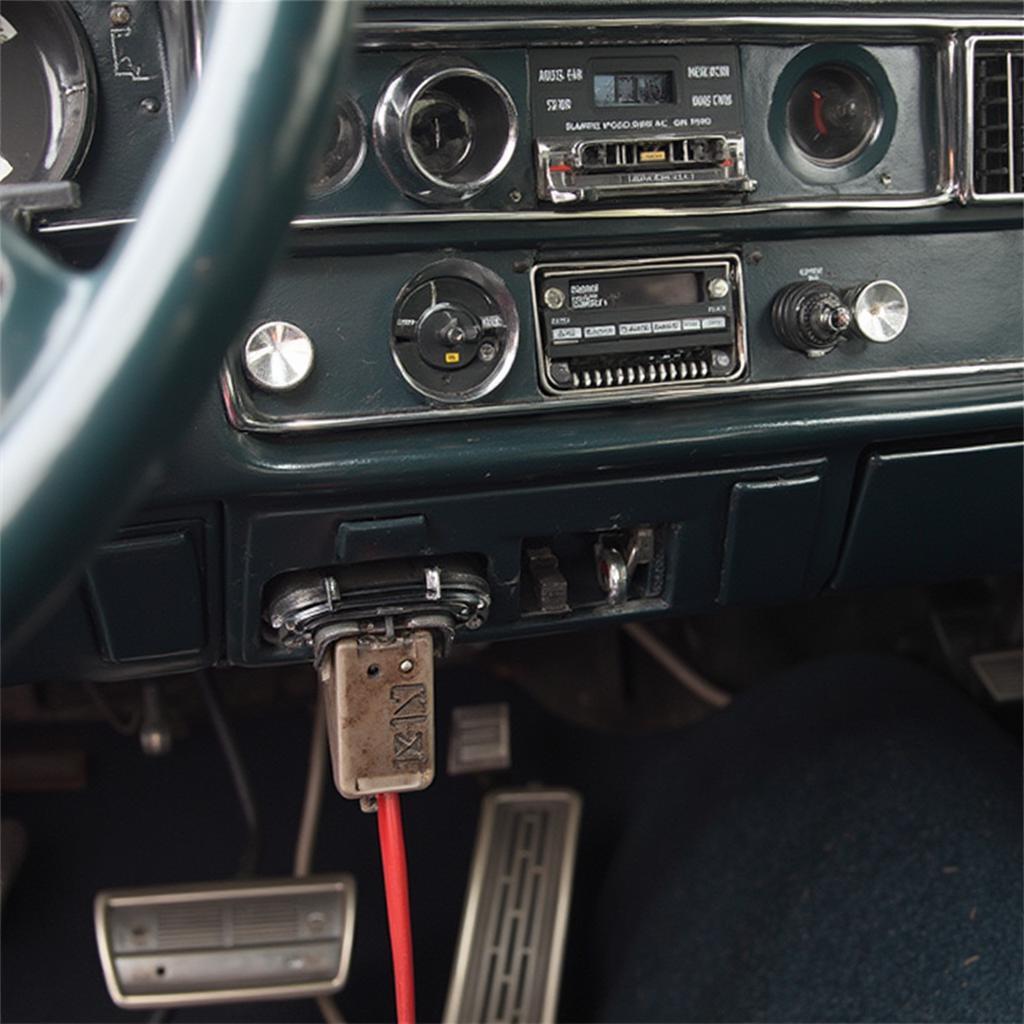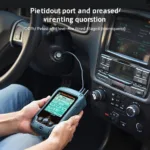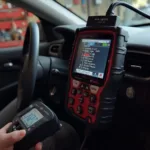Connecting a 12-pin ALDL connector to an OBD2 interface is a common need for owners of older GM vehicles. This article provides a comprehensive guide to understanding the 12 pin ALDL to OBD2 conversion process, enabling you to access valuable diagnostic information from your pre-OBD2 vehicle using modern OBD2 scanners.
Understanding the difference between the older 12-pin Assembly Line Diagnostic Link (ALDL) connector and the standardized OBD2 port is crucial. ALDL was primarily used in GM vehicles manufactured before 1996, while OBD2 became mandatory for all vehicles sold in the United States starting in that same year. While the two systems serve similar purposes—providing access to diagnostic trouble codes (DTCs)—they operate on different protocols and require different connectors. This necessitates the use of a 12 pin ALDL to OBD2 adapter for compatibility. Knowing the pinouts of both connectors is crucial for a successful conversion.
Understanding the 12 Pin ALDL System
The 12-pin ALDL system offers a basic level of diagnostic functionality. It primarily focuses on engine-related issues, providing access to DTCs related to fuel injection, ignition, and emissions systems. Early ALDL systems often required specific diagnostic tools tailored to the vehicle’s make and model.
Common Issues with 12 Pin ALDL Systems
One frequent challenge with ALDL systems is the limited amount of data they provide compared to OBD2. Another issue is the variability in pinouts between different GM models, which can add complexity to the diagnostic process. Locating the ALDL connector itself can also be tricky, as its position can vary depending on the vehicle. Sometimes, it’s hidden under the dashboard or in the engine compartment.
Making the Connection: 12 Pin ALDL to OBD2 Adapters
12 pin ALDL to OBD2 adapters are readily available and provide a seamless way to bridge the gap between these two diagnostic systems. These adapters typically convert the ALDL signal into a format compatible with standard OBD2 scanners. Choosing the right adapter is essential to ensure proper communication between your vehicle and scanner.
Selecting the Right 12 Pin ALDL to OBD2 Adapter
Several factors should be considered when selecting an adapter. Ensure compatibility with your specific GM vehicle model and year. Check the adapter’s supported communication protocols. Some adapters offer additional features, such as data logging or real-time sensor readings. Check our article on the gm obd2 serial port connector for more information.
Troubleshooting Common Connection Issues
While using a 12 pin ALDL to OBD2 adapter is generally straightforward, occasional issues can arise. If you encounter problems connecting or reading data, double-check the adapter’s compatibility with your vehicle. Ensure the ignition is turned on when attempting to establish communication. Verify that the pins on both the ALDL and OBD2 connectors are clean and free of corrosion. You can also check our article on the obd2 aldl connector for further information.
Expert Insight from David Miller, Automotive Diagnostics Specialist
“One common mistake people make is using a generic OBD2 scanner with an ALDL adapter and expecting to see a full range of data. Remember that the ALDL system is more limited than OBD2. You’ll primarily be accessing engine-related codes.”
Utilizing the OBD2 Scanner with your ALDL-Equipped Vehicle
Once connected, you can use a standard OBD2 scanner to retrieve DTCs from your pre-1996 GM vehicle. Many scanners also allow you to clear codes and monitor live sensor data, providing valuable insights into your vehicle’s performance. Check our article about the obd2 port wiring for 87 chevy truck as an example. You might also find our article on the gm obd2 serial port useful.
Expert Insight from Sarah Johnson, Automotive Engineer
“Using an OBD2 scanner with an ALDL adapter can significantly simplify the diagnostic process for older GM vehicles, making it more accessible to DIY enthusiasts and mechanics alike.”
Conclusion: Unlocking Diagnostic Power with 12 Pin ALDL to OBD2 Conversion
Converting from a 12 pin ALDL connector to OBD2 allows you to leverage modern diagnostic tools with your older GM vehicle. While some limitations exist due to the inherent differences between the systems, using an appropriate adapter provides a cost-effective way to access and interpret valuable diagnostic information. Remember to choose a compatible adapter and familiarize yourself with your specific vehicle’s pinout configuration for a successful conversion. Check out our resource on obd2 aldl pinout for a comprehensive understanding.
FAQ
- Can I use any OBD2 scanner with a 12 pin ALDL adapter? Most OBD2 scanners are compatible, but it’s best to check the scanner’s specifications to ensure it supports the ALDL protocol.
- Where can I find my vehicle’s ALDL connector? The ALDL connector is typically located under the dashboard or in the engine compartment. Consult your vehicle’s service manual for its exact location.
- What kind of data can I access with an ALDL to OBD2 conversion? Primarily engine-related DTCs and some live sensor data, depending on the adapter and scanner.
- Will the adapter work with all GM models? Ensure the adapter you choose is specifically designed for your vehicle’s make, model, and year.
- What if I have trouble connecting? Double-check compatibility, ensure the ignition is on, and inspect the connector pins for cleanliness and proper connection.
- Can I clear DTCs with an OBD2 scanner after the conversion? Yes, most OBD2 scanners allow you to clear codes after retrieving them.
- Where can I purchase a reliable 12 pin ALDL to OBD2 adapter? Reputable automotive parts stores and online retailers offer a variety of adapters.
Need help? Contact us via WhatsApp: +1(641)206-8880, Email: [email protected] or visit us at 789 Elm Street, San Francisco, CA 94102, USA. We offer 24/7 customer support.


